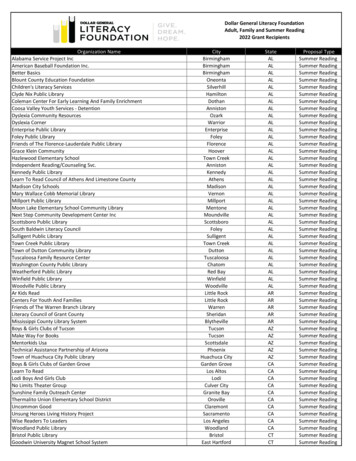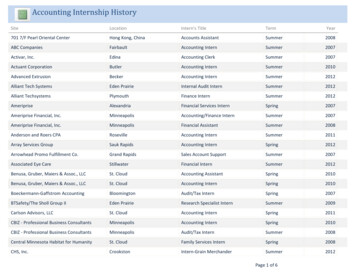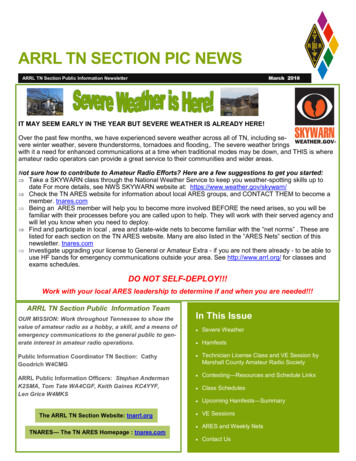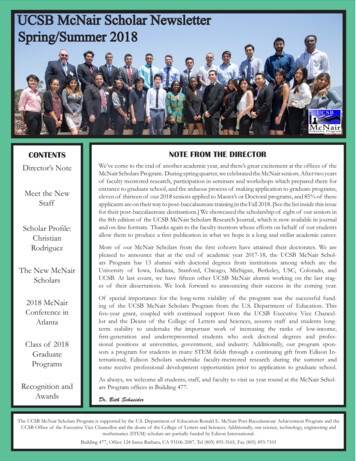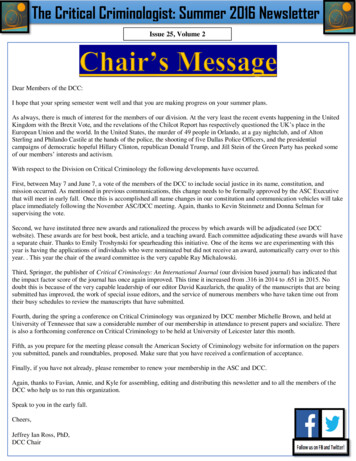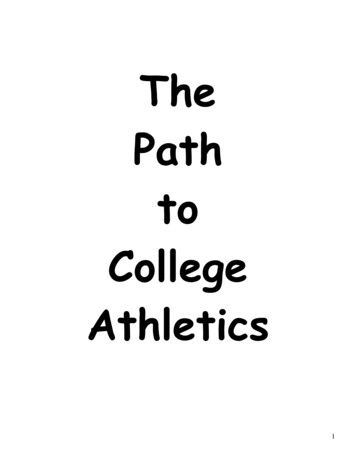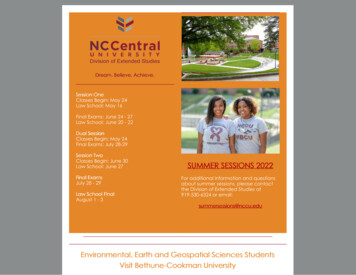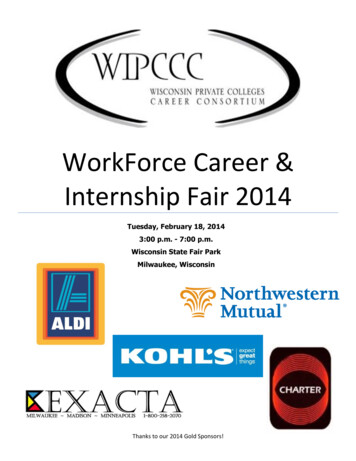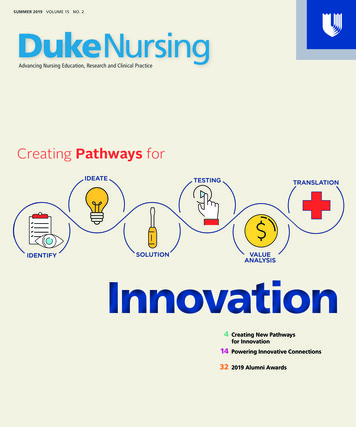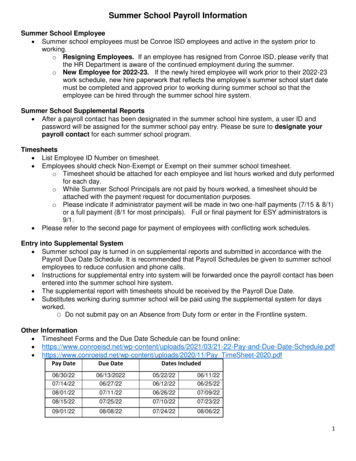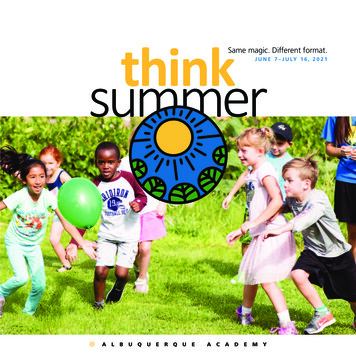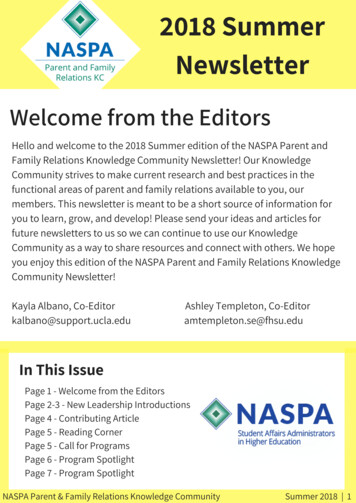
Transcription
2018 SummerNewsletterWelcome from the EditorsHello and welcome to the 2018 Summer edition of the NASPA Parent andFamily Relations Knowledge Community Newsletter! Our KnowledgeCommunity strives to make current research and best practices in thefunctional areas of parent and family relations available to you, ourmembers. This newsletter is meant to be a short source of information foryou to learn, grow, and develop! Please send your ideas and articles forfuture newsletters to us so we can continue to use our KnowledgeCommunity as a way to share resources and connect with others. We hopeyou enjoy this edition of the NASPA Parent and Family Relations KnowledgeCommunity Newsletter!Kayla Albano, Co-Editorkalbano@support.ucla.eduAshley Templeton, Co-Editoramtempleton.se@fhsu.eduIn This IssuePage 1 - Welcome from the EditorsPage 2-3 - New Leadership IntroductionsPage 4 - Contributing ArticlePage 5 - Reading CornerPage 5 - Call for ProgramsPage 6 - Program SpotlightPage 7 - Program SpotlightNASPA Parent & Family Relations Knowledge CommunitySummer 2018 1
NewsletterPFRKC Leadership IntroductionsKayla Albano,Newsletter Co-EditorKayla is a Southern California native, holding a B.A. in Political Science from California StateUniversity, Fullerton, and an M.A. in Student Affairs Administration from Michigan StateUniversity. She currently serves as the associate director for UCLA’s Office of Parent andFamily Programs where she oversees the office’s digital communications. Before joining theParent and Family Programs team at UCLA Kayla was a resident director at LoyolaMarymount University, where she worked peripherally with the parent and family population.As a student affairs educator, Kayla strives to empower students with the knowledge andtools necessary to realize their full potential and believes partnerships with students’ familiesare imperative to this growth. As such, Kayla actively pursued opportunities to engage withfamilies directly as a new professional, previously working as a parent program intern atJohnson and Wales University and researching opportunities to develop parent and familyprograms at Michigan State University.Ashley Templeton, Newsletter Co-EditorHello! My name is Ashley Templeton and I am the Graduate Assistant for New Student &Family Programs at Fort Hays State University where I will be a second-year this coming fall. Iam from Wilson, KS, where I have lived my entire life and then moved 45 long minutes toHays, KS where I have been at FHSU since I was a freshman majoring in OrganizationalLeadership. I absolutely love working with parents and families and am so happy to be ableto serve in this capacity, helping more parents and families across the country through thenewsletter! Some of my favorite things include my family, my cat Mae, photography, reading(for fun, of course!), and sleeping. because what grad student doesn't need more sleep? Feelfree to reach out to me if you would like to connect, I love meeting new people!Adrienne Kravitz,Region II RepresentativeI am a double alumna of Hofstra University, receiving a Bachelor of Arts in Psychologyand Early/Childhood Elementary Education and my Master of Science in SpecialEducation. I began my work in higher education through my graduate assistantship inthe Office of Off-Campus Living and Commuting Student Services. I now serve as theAssistant Director of Parent and Family Programs at Hofstra University.As Assistant Director for Parent and Family Programs, I aim to be a resource for allHofstra parents and families. I engage families through various events andcommunication throughout the year. I strive to work together with parents and familiesto best support our students to succeed and to celebrate in their achievements.I am honored to serve as the new Parent and Family Relations Knowledge CommunityRegion II Representative. I look forward to working with you to enable all of us tobecome more knowledgeable about best practices in family relations at yourinstitution.NASPA Parent & Family Relations Knowledge CommunitySummer 2018 2
NewsletterPFRKC Leadership IntroductionsHello everyone! My name is Kimberly Alvarez, I am honored to have been selected to representand serve as NASPA's Region VI Representative for the Parent and Family Relations KnowledgeKimberly Alvarez,Community (PFRKC). As a first generation college student I attribute my resilience to continue myRegion VI Representativeeducational trajectory to my parents, family, and extended loved ones. I acknowledge the needfor parent and family programming within higher education institutions in order to support themultifaceted needs of our students. As I attended California State Polytechnic University Pomonaas an undergraduate, there were many family inclusive events on campus that helped engage myloved one's with my academic community. My Gender, Ethnic, Multicultural Studies (GEMS) majorprofessors, including my mentor Dr. Aguilar-Hernandez, played a major role in expanding mysocial justice knowledge to include parents and family in my work. Now as a graduate student ofPostsecondary Administration and Student Affairs, attending the University of Southern CaliforniaI have had the privilege to work within multiple departments assisting students, parents, andfamilies acclimate to a large university. Soon after earning my Masters degree from USC, I willpursue my doctoral degree to continue my influence as a student affairs professional.I am grateful to be a part of such a prestigious association and look forward to continue serving invaried capacities as time progresses. Please feel free to connect with me, I would love to hearabout the efforts being made across campuses to support college students, parents, and families.Karina M. Viaud earned a Psychology degree from Bridgewater State University in Bridgewater,Massachusetts, a master’s degree in College Counseling and Student Services from theUniversity of San Diego, and a doctorate in Educational Leadership from the joint program at theUniversity of California San Diego and California State University San Marcos. Her dissertationinvestigated the educational experience of first-generation doctoral students of color. Becauseof the narrative approach toward the study, Karina believes in the power of voices and stories tobring deep insight of lived experiences of marginalized and underrepresented persons indominant cultures and systems. She also believes that educators contribute to the shaping ofstudents’ experiences through everyday behaviors.She’s presented her research at national and regional conferences of American EducationalResearch Association (AERA) and National Association for Student Personnel Administrators(NASPA). She has 15 years of experience working in Student Affairs, Development and EnrollmentManagement serving culturally different students and parents. Karina continues to investigateeducation with a social justice lens. Accepted proposals include Ready or Not, They Exist! SameSex Parents and Their Student; and Emotionally Overloaded! Understanding UndocumentedStudents, both presented at the 2015 NASPA Western Regional Conference. Additionally, she’spresented at the International Congress for School Effectiveness and Improvement (ICSEI) inOttawa Canada and Singapore focusing on access, inclusion and student success for doctoralstudents of color. She also recently co-authored Weekend Warriors Unite: Six Women’s Personaland Professional Growth in Social Justice Leadership with the NASPA Journal of Women inHigher Education. Currently, she serves as Senior Officer for Parent and Family Programs at UCSan Diego and, in various forms, supports parents of undergraduate students.NASPA Parent & Family Relations Knowledge CommunityKarina M. Viaud,Awards ChairSummer 2018 3
NewsletterIntentionally Supporting OurNon-Native Speaking Parents Contributing ArticleOne of the main reasons that I decided to pursue a career in higher education was because of my experiencenavigating the world of higher education, not only as a first- generation student, but also as an immigrant. Thiscreated a combination of difficulties, not only for myself, but also for my entire family as they were trying tosupport and guide me. I experienced the challenges that typically come along with being a first-generationcollege student as well as having to navigate the system alone because family could not understand theprocess nor could they fully comprehend the language.Many times during the application process and orientation process I thought about going by myself and nottaking my parents with me. This thought came from a variety of reasons - they would be forced to sit throughendless presentations and workshops that they would not understand or I would have to spend the entire timetranslating what is being said to them, meaning that I would not have the opportunity to fully grasp what wasbeing presented. Having been able to successfully work through these obstacles and seeing so many of myfellow Hispanic classmates not make it through to graduation became my driving force and passion.This is one of the main reasons that drove me to become involved withour Hispanic College Institute. The Institute brings in high school juniors andseniors for a four-day program, providing them with the opportunity tounderstand the college application process and giving them a briefexperience into what the life of a college student is. Throughout the weekthey are immersed with speakers; student LEADS and panelists that sharesimilar backgrounds with them and provide them with examples of whattheir lives could be if they pursue a higher education. The most impactfulmoment of the program came during our closing ceremony brunch whereparents and families of the students are invited to come to celebrate theirstudents. This would have been one of those events where I would have hesitated to bring my parents becauseI would have assumed it would be yet another terrible experience for them. I had the opportunity to welcomethe families as they were arriving and watching their expressions change completely when speaking with themin Spanish made it all worthwhile. They were coming in with the expectation of having language barriers butinstead were met by staff that can communicate with them allowing them to become an active participant inthe celebration.Being intentional in the way we balance the needs of our student’s parents andfamilies is instrumental when it comes not only to recruiting those students, but alsoin retaining those students. We must not only embrace the student but we mustembrace their families, acknowledge their struggles and obstacles, and do our bestto alleviate those obstacles that are within our control. By being intentional in ourhiring practices and being proactive in the structure of our programs, we can makethe process easier for diverse student populations.Diego H. Esparza, Graduate Assistant for Enrollment Management Fort Hays State UniversityNASPA Parent & Family Relations Knowledge CommunitySummer 2018 4
NewsletterReading CornerCampusESP sponsored an analysis of student persistence atAbilene Christian University. The research was summarized byKayla Reed-Fitzke, a PhD in couples and family therapy from theUniversity of Iowa, who has also authored other related studiessuch as Helicopter Parenting and Emerging Adult Self-Efficacy:Implications for Mental and Physical Health (2016) and NickPeterson, Director of Analytics at Abilene Christian University.Student Persistence Increases with Parent Engagement featuresfindings based on 993 students enrolled in the study at AbileneChristian University (ACU) in the Fall of 2016.Results showed that 82.5% of the 396 connected students persisted to the second year of college.In comparison only 72.4% of the 597 students who were not connected to parents persisted.To read more and for a free download of the study, click here.Have a great program proposal for the 2019 NASPA AnnualConference? Want to be sponsored by the Parent and FamilyRelations Knowledge Community?The 2019 Call for Programs is open! Submit your proposal bySeptember 4 to be considered. Submit your proposals here.NASPA Parent & Family Relations Knowledge CommunitySummer 2018 5
NewsletterProgram SpotlightLoyola University MarylandMessina Family Weekend Teach In: An opportunity for families to experience Loyola UniversityMaryland’s living-learning program for studentsEvery year, Loyola University Maryland hosts Family Weekend, an annual event held at the end of September/early October forcurrent students and their families. The weekend is composed of a number of events including a student leadership awardsceremony, student research presentations, athletic events, communal meals, and other opportunities led by faculty and staff towelcome families to campus for the weekend.Five years ago, Loyola implemented a new living-learning program for first-yearstudents called Messina. As part of Messina, more than 200 faculty members,administrators, and student leaders partner to provide every first-year student anexperience participating in two interdisciplinary, linked seminar courses (one in the falland one in the spring semester) connected to one of four themes: Self and Other,Stories We Tell, The Good Life and The Visionary. Within their two courses, studentsexperience how faculty from diverse disciplines approach similar topics but in theprocess pose different questions, assert differing viewpoints, and attack problems in avariety of ways.During its program rollout in 2013, Messina wanted to provide an opportunity forfamilies to experience what it is like for their students participating in a Messina seminar.This idea then became the Messina Family Weekend Teach-In. Families attending this event have the opportunity to participatein two, 45-minute sessions that demonstrate how Loyola connects learning in and out of the classroom led by Messina facultyand administrators. In addition to this content, Messina also sponsors a free ice cream social in between the two sessionsfeaturing products from a local Baltimore ice cream company.To implement this annual event, Messina reaches out to faculty and mentors in lateJuly/early August with a call for session facilitators. Volunteers are asked to lead 1-2sessions that do one or more of the following: directly address the content of their Messinaseminar course, provide an enrichment activity connected to the Messina theme,demonstrate the ways in which faculty link the two courses in their Messina pairing, or asession that addresses the first year Common Text. This past year, sessions ranged fromtwo professors connecting their Messina theme to their respective academic disciplines, atheology professor covering content from her course about faith traditions and ritualcelebrations, and two administrators facilitating a session on Baltimore’s diverseneighborhoods and history. In previous years, content has also included topics connected to our Jesuit mission and Loyola’spartnership with our surrounding community. These faculty and staff members try to find ways to engage families and studentsduring their presentation.While marketed to first-year students and their families, this past year attendees also included families who attended thissession during a previous year and had an interest in experiencing this event for a second time. Since topics and presenterschange each year, this is a program that offers new content in a common format. For more information about Loyola’s FamilyWeekend and the Messina Teach In, please visit here. If you would like to speak more to someone about the Messina Teach In,please email messina@loyola.edu with your questions.NASPA Parent & Family Relations Knowledge CommunitySummer 2018 6
NewsletterProgram SpotlightAdded Value ProgrammingThe University of AlabamaAs a result of a reorganization within the Division of Student Life at The University of Alabama, FYE & ParentPrograms split into two offices: FYE & Retention Initiatives and Parent & Family Programs. With this split came adivision of staff and resources. With a much smaller staff and a new directive to broaden offerings for UA parents andfamily members, we focused on maintaining the signature offerings already in place (Parent & Family Orientation,Family Weekend, Parent Advisory Council, and monthly newsletter) and expanded “programming” through what wecall “Added Value Programming”.We know that parents & families visit campus every day for a variety of reasons but we do not have the peoplepower or fiscal resources to host a reception every day nor host a Family Weekend every weekend. In order to bemore efficient with both human and financial resources, we identified a few reasons/dates when a large number ofparents & families may be on campus and then brainstormedways to “add value” to their visit in a low cost/low labor way.For the 2017-2018 academic year, here are a few examples ofour “Added Value Programming”. Move In FreezePops: Parent Ambassadors (student staff)passed out freeze pops to UA families as they waited in thepackage pick up line during Move In. Family Photo Booth for Honors Day: A longstanding UA tradition is Honors Day, which is the first Friday of April,when classes are cancelled and all honor societies hold their induction and recognition ceremonies. Families cometo campus to celebrate their students’ accomplishments. This spring, in partnership with the Office of StudentMedia, we offered the opportunity for families to get their photo taken when dressed for the occasion. Welcome Postcards for Greek Parents Weekends: Parent & Family Orientation hosts Family Weekend in the fall butevery Greek chapter then hosts parents/family/moms/dads weekends throughout the spring. Details for theseweekends always seem last minute and hard to collect. Instead of hosting separate events each weekend, our officepartnered with our campus bookstore and produced a welcome postcard with a bookstore coupon attached andsent 25 to each chapter for distribution to their participants. Proud of my Bama Grad buttons: Distributing buttons during the fall, summer, and 4 commencement ceremoniesin the spring would be cost prohibitive so we are strategic about when and where families can get these buttons.Every semester we distribute buttons at the Commencement Reception hosted by the President’s Office that isopen to all celebrating families. Additionally, for spring commencement, we distribute buttons at our LavenderCommencement, Nyansapo Graduation Celebration – Kente Robing Ceremony, and Veteran & Military AffairsGraduation Celebration.We look forward to adding value to Homecoming for alumni family members and to end of semester student pickup during the upcoming academic year.NASPA Parent & Family Relations Knowledge CommunitySummer 2018 7
Page 5 - Call for Programs Page 6 - Program Spotlight Page 7 - Program Spotlight . Soon after earning my Masters degree from USC, I will . Christian University (ACU) in the Fall of 2016. Results showed that 82.5% of the 396 connected students persisted to the second year of college.
